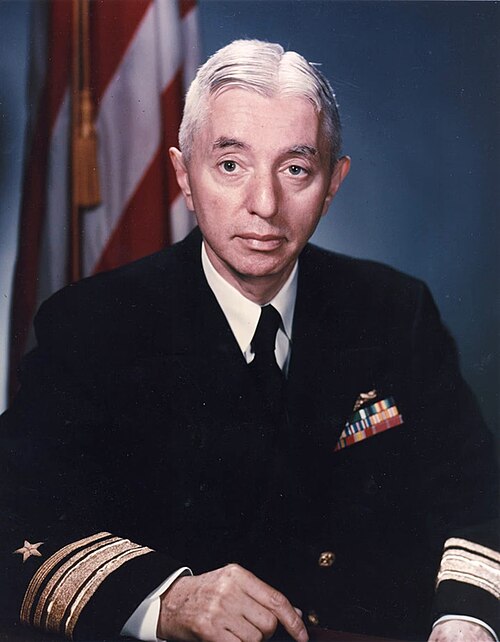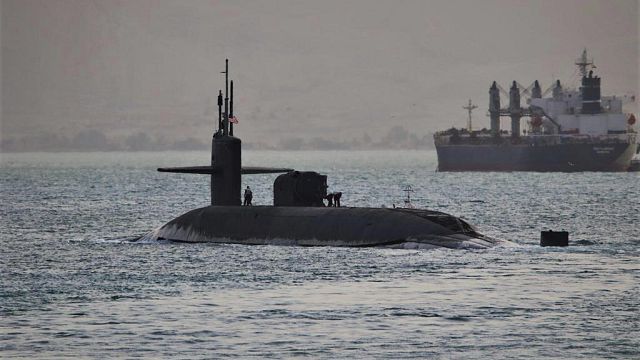The Rickover Corpus: A digital archive of Admiral Rickover's speeches and memos

The Rickover Corpus
A digital archive of Admiral Hyman G. Rickover’s speeches and memos
Admiral Hyman Rickover, also known as the "Father of the Nuclear Navy", built the first nuclear-powered submarine and civilian nuclear reactor.
As the U.S. returns once more to an era of shipbuilding and building nuclear energy infrastructure, understanding Rickover's management methods is of even greater importance.
This website is a searchable digital archive of Admiral Hyman G. Rickover’s speeches, congressional testimonies, and memos. It includes over 2,500 pages of documents, including over 1,800 pages of never before seen digitized artifacts from the U.S. Naval Academy Archives
| Title | Year | Summary | Source | Links |
|---|
Selected Excerpts
“Any comparison of the Soviet and U.S. Navy must be viewed from the context that we are a maritime power dependent upon being able to maintain sea lanes of communication necessary to conduct military operations overseas and to support our allies. The mission of our navy is a far more difficult one than that of the Soviets of denying us free use of the seas. We have given up any chance of matching the Soviet Navy in number of ships. Therefore the quality of our ships must be superior. It is axiomatic that a nation dependent on the quality of its weapons must design its forces around an offensive strategy if it is to prevail over a numerically superior foe”
“A person doing a job—any job—must feel that he owns it and that he will remain on that job indefinitely. If he feels he is a temporary custodian, or is using the job as a stepping stone to a higher position, his actions will probably not take into account the long-term interests of the country. Lack of commitment to the present job will be perceived to those who work for him and they also will tend not to care. If he feels he owns his job and acts accordingly, he need not worry about his next job. He should exercise devotion to his work as if his children were the direct beneficiaries of what he is doing, as indeed they are. Too many spend their entire lives looking for the next job. We need to make it challenging and rewarding for managers to remain in one organization for more than a few years. Thereby the organization will benefit from their knowledge, experience, and “corporate” memory…
Unless the one person truly responsible can be identified when something goes wrong, then no one has been really responsible”
“The first step toward accomplishing anything is to have a goal. Goals are set by people and not by organizations. At some point, sooner or later, organizations lend their names to a project, but the concept and the initial work is always started by an individual. This is difficult for military people to comprehend, because they are used to operating under a relatively rigid impersonal system. Official letters, for example, are written in the third person; the appearance is that a Bureau or an Office does something. It should be obvious that Bureaus and Offices are inanimate, and therefore cannot generate ideas or do things.”
“I am not wearing any hat right now. I never know which hat I am wearing. I understand there are job descriptions in the Navy and in the [Atomic Energy Commission] which say what I am supposed to do, but I have been too busy to read them. I only know that I am responsible. That’s enough.”
“The development of naval nuclear-propulsion plants is a good example of how one goes about getting a job done. It is a good subject to study for methods, because it involves not only the accomplishment of a recognized difficult technical operation, in which expenditure of hundreds of millions of dollars is necessary, but also because it involves the intimate working together of two large governmental organizations, the Navy on the one hand, and a civilian organization, the Atomic Energy Commission on the other. It has involved the establishment of procedures and ways of doing government business for which there was no precedent, and which I believe will be necessary in future for similar large projects.”
“Well I know that if we cut the people in the Pentagon by about twenty to thirty percent, a lot of the work would go on much quicker than it does now.”
“Democracy is the only government worthy of free men; it is also the most difficult. It will not run well unless all the people, or at least a majority, possess those qualities of mind and character that in other forms of government are needed by none but a small governing group. We are not born with these qualities. We must acquire them through effort; we must be carefully guided and taught by home, church, and school. Hence the overriding importance of education in a democracy, education which enhances the human personality – not narrow vocational training to equip young people with a saleable skill – for in a democracy people are much more than mere breadwinners.”
“To an educationist, a person who is not a “professional” educator can offer no valid criticism since education is not This is not a sincere argument, for the leaders of American education are extremely intolerant of criticism by members of their own profession as well. A teacher jeopardizes his job if he exercises the right of free speech in a manner even implying mild criticism. I myself and most other critics have received many letters from teachers expressing their deep dissatisfaction with American education but begging not to be quoted by name. Virginius Dabney, winner and editor of the Richmond, Virginia Times-Dispatch commented editorially in 1954 on this tacit censorship by the educationist top command: “It is highly disturbing,” he said, “that teachers in good standing feel they cannot constructively criticize things that are happening in the schools…without risking their jobs. For such thought-conformity to be forced upon teachers of all people – the very members of society who are supposed to be promoting intellectual freedom and the healthful interchange of opinion – is double shocking.”
“A single phrase such as ‘government’ or private ‘industry’ is not adequate to describe our method of operation. We have built up something unique and new, and I believe this method of operation is in itself an important development. We have worked out a system which combines the peculiar abilities and experience of industry, the utility industry, the Atomic Energy Commission, and the Congress. In addition, of course, we draw on our experience and capabilities in the Navy, and the Navy in turn benefits from the things we learn at Shippingport.
This arrangement combines centralized decision-making and responsibility – which enables us to move just as fast as would be possible a totalitarian state – but with private industrial ingenuity and democratic processes; our work is under constant scrutiny by Congress which controls the expenditure of funds, and has final authority over the entire program.”
Document View
Loading document...
What's Your Reaction?
 Like
0
Like
0
 Dislike
0
Dislike
0
 Love
0
Love
0
 Funny
0
Funny
0
 Angry
0
Angry
0
 Sad
0
Sad
0
 Wow
0
Wow
0









































